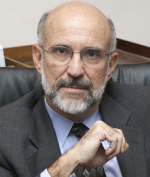 Enrique Iglesia received a B.S. from Princeton University (1977, summa cum laude) and a Ph.D. from Stanford University (1982) in Chemical Engineering. In 1993, he joined the University of California at Berkeley as Professor of Chemical Engineering, after twelve years of research and management experience at the Exxon Corporate Research Laboratories. He is currently the Theodore Vermeulen Chair in Chemical Engineering at the University of California at Berkeley and a Faculty Senior Scientist in the E.O. Lawrence Berkeley National Laboratory. He has served as Editor-in-Chief of the Journal of Catalysis (1997-2010) and as President of the North American Catalysis Society (2009-2017). He is currently the Vice-President and President-Elect of the International Association of Catalysis Societies.
Enrique Iglesia received a B.S. from Princeton University (1977, summa cum laude) and a Ph.D. from Stanford University (1982) in Chemical Engineering. In 1993, he joined the University of California at Berkeley as Professor of Chemical Engineering, after twelve years of research and management experience at the Exxon Corporate Research Laboratories. He is currently the Theodore Vermeulen Chair in Chemical Engineering at the University of California at Berkeley and a Faculty Senior Scientist in the E.O. Lawrence Berkeley National Laboratory. He has served as Editor-in-Chief of the Journal of Catalysis (1997-2010) and as President of the North American Catalysis Society (2009-2017). He is currently the Vice-President and President-Elect of the International Association of Catalysis Societies.
Professor Iglesia is a member of the National Academy of Engineering, the American Academy of Arts and Sciences, and the National Academy of Inventors, a Fellow of the American Chemical Society, and the American Institute of Chemical Engineers, and an Honorary Fellow of the Chinese Chemical Society. He has received a Senior Scientist Award from the Alexander von Humboldt Foundation and Doctor Honoris Causa degrees from the Universidad Politecnica de Valencia and the Technical University of Munich. His research has been recognized with the George A. Olah Award in Hydrocarbon Chemistry and the Gabor Somorjai Award for Creative Research in Catalysis of the American Chemical Society, the Award for Excellence in Natural Gas Conversion, the Wilhelm Manchot Chemistry Prize of the Technical University of Munich, the Richard H. Wilhelm Award in Chemical Reaction Engineering, the Alpha Chi Sigma Award for Outstanding Research in Chemical Engineering, and the William H. Walker Award for Excellence in Contributions to the Chemical Engineering Literature of the American Institute of Chemical Engineers, and the Paul H. Emmett Award in Fundamental Catalysis and the Robert Burwell Lectureship of the Catalysis Society. He was named to the V.N. Ipatieff Distinguished Professorship at Northwestern University, as the Cross Canada Lecturer of the Chemical Institute of Canada and as the inaugural recipient of the Tanabe Prize in Acid-Base Catalysis. His teaching awards include the Donald Sterling Noyce Prize, the top teaching award in the physical sciences at Berkeley, the Best Teacher Award of the College of Chemistry, and the Award for Excellence in Teaching of the American Institute of Chemical Engineers. He has served the National Academies as member of panels for the National Research Council and of the Peer Committee and as Chair and Vice Chair of the Nominations Committee and of the Chemical Engineering Section of NAE.
His research group addresses the design, synthesis, and structural and mechanistic characterization of inorganic solids useful as catalysts for chemical reactions important in the production, conversion and use of energy carriers, in sustainable petrochemical syntheses, and in the protection of the environment. These studies exploit novel synthetic protocols for the synthesis of active nanostructures and of isolated single-site catalysts within microporous and mesoporous solids, as well as techniques for the characterization of the local structure and atomic connectivity in these inorganic solids, in most instances during catalytic reactions. These studies also involve steady-state and transient kinetic methods and isotopically labeled reactants and products in order to elucidate the mechanism of catalytic reactions on surfaces, at the level of primary and secondary reaction networks and of elementary surface steps using a seamless combination of systematic experimental assessments benchmarked against rigorous analysis by density functional theory and higher-level treatments. The relevance of his research to the practice of catalysis is evident from his many patents, several of which have provided enabling intellectual property for processes involved in the conversion of natural gas, in applications of zeolite catalysis to petrochemicals synthesis and environmental control, and in the conversion of renewable oxygenate feedstocks to fuels and chemicals.




